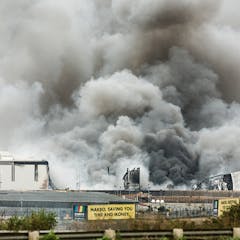
Articles on Law and order
Displaying 1 - 20 of 38 articles

You might want to think twice before hiring Harvey Specter or Annalise Keating as your lawyer. The more accurate depictions of legal practice on TV might not be where you think.

‘No body, no parole’ laws may at first appear to be in the public interest. But there’s a lack of evidence they work and a risk they may disproportionately penalise the wrongfully convicted.

Historically, most mass shootings in South Africa have been associated with three main things: gang conflicts, rivalries in the minibus taxi sector and factional or inter-group feuds.

The Kenya that Njonjo sought to create was the ‘greatest living example of democracy, justice and peace’ – but there was no space for the poor.

As the July 2021 unrest and looting graphically showed, crime and lawlessness can debilitate and destroy government efforts to facilitate and support economic growth.

Minneapolis residents voted 56% to 44% against an amendment that would have transformed the city’s police. The reasons they did so are complicated, an expert writes.

An uncomfortable reality is that looting is perceived by the looters to be socially acceptable and is often encouraged and endorsed within social and community networks.

After 1994 efforts were made to embed democracy. The focus was on policy and institution-building. What was missing was ensuring all South Africans were on board.

South Africa can’t possibly remain the same country in the aftermath of this mayhem. There are just too many storms ahead to simply continue unchanged.

The rejection of the bill on its merits means that Gambians will not get to see this version of the 2020 draft constitution in a future referendum.

President Trump’s law-and-order campaign rhetoric has been compared to Richard Nixon’s and George Wallace’s similar themes in 1968. But such appeals go much further back, to the US in the early 1800s.

History should give Trump reasons for optimism. The presidential elections in 1968 and 1988 provide a template for Republican victory on a law-and-order platform in 2020.

For many Americans, law and order has long been as much a private matter as something for the government to handle.

The task team established to investigate political killings in KwaZulu-Natal has had little impact on exposing those behind the violence.

Those living in rural areas have more punitive attitudes toward crime and how to control it than city-dwellers, and it’s a major component of the growing urban-rural divide in Canada.

Democracy is not perfect. Sometimes it produces policies that are undemocratic and unjust. In those cases, breaking the law may be justified.

Using the military continuously in internal roles for which it is not structured, funded or trained simply speeds up its decline.

The biggest problem with using the military to fight rime is that soldiers are not trained for law enforcement, but warfare, using maximum force.

At one time, law and order was seen by some as a sure-fire voter winner in elections - but that’s changing after a concerted effort by Victoria’s opposition appeared to backfire badly.

The Verdins principles affect the way offenders with mental health problems are sentenced in a court of law.





